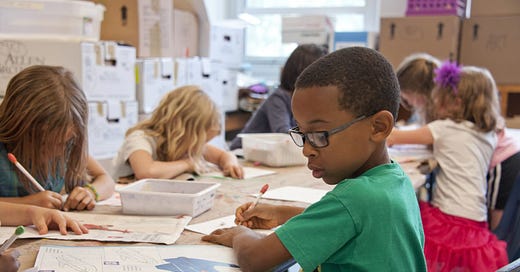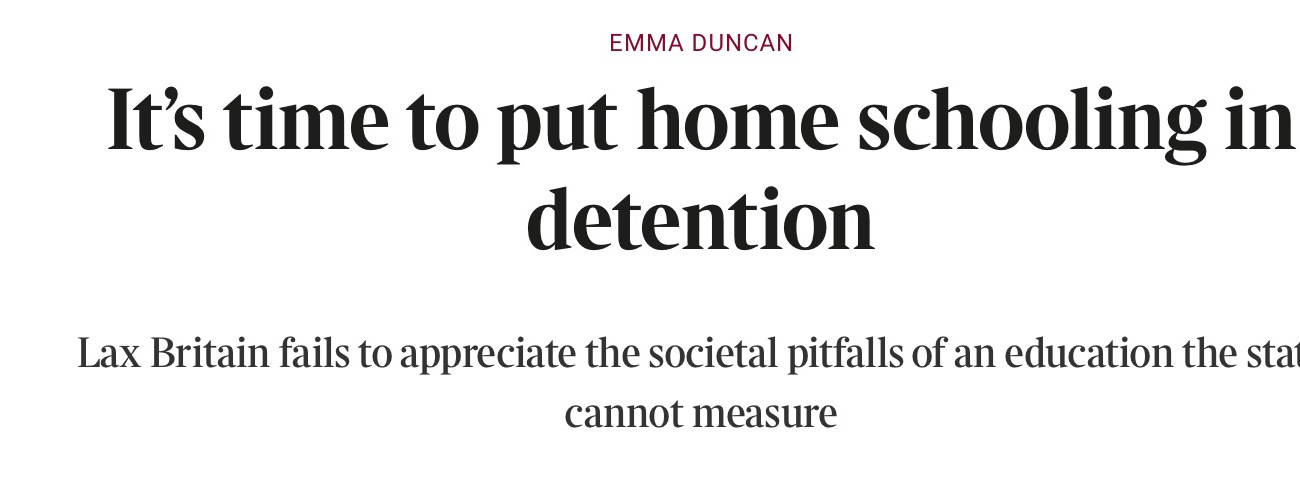A peek inside an ‘Outstanding’ UK state school
And links to bits and pieces you might have missed.
A home-educating friend recently chose to send her son to school (he was keen to give it a try). It’s been a fascinating opportunity to contrast two systems, home education and state education, and to see how the two compare. Of course, this is just one boy in one school, so it’s not necessarily representative of anything wider. And as you’ll see, it’s not a clear-cut case of home-ed good/state school bad, or vice versa. But whichever way you look at it, it’s eye-opening.
Her son is in Year 4 (aged 8-9). Both mother and child are bright and conscientious (the mother has two English degrees), but he has certainly not been hot-housed or had the full Susan Wise-Bauer treatment. She says they did use some curricula at home, but only loosely, and they agreed there were some things that had to happen every day, such as reading. The school, to their credit, were very welcoming and not at all phased by a home ed child joining their class.
For non-UK readers, state school is government-funded school—the kind of school attended by 93% of children here. State schools have to follow the National Curriculum. This school has been given the top rating of Outstanding by Ofsted, the government education standards body. 16% of schools achieve this rating.
Here’s their experience…
The boy is academically ahead in all areas and is the best reader in the class, according to his teacher. This is despite the schoolchildren having had daily reading lessons for the past four years (although lots of the children have English as a second language). Bear in mind that UK parents are constantly being told that to miss a single day of school will damage their child’s chances later in life.
History and geography are alternated each term—so one term, the children study history, and the next term, geography. There are three terms in the UK school year. [To me this seems bizarre, especially as at this age the two subjects can be easily complementary, along with science.]
Art and music lessons happen once a term. French is half an hour per week.
The first science lesson (one hour per week) was cutting out paper animals and putting them into piles of vertebrate or invertebrate.
The children spend one hour a day on multiplication tables. Some of you will think that’s crazy because you don’t think times tables matter. I think they matter a lot, but I think an hour a day is a bizarre and inefficient way to get a child to learn them—and at what cost to other subjects?
Socialising is much easier at school. “We found it very easy to socialise as home educators but building actual lasting friendships was very difficult. Obviously early days yet but being with the same kids 5 days a week has meant he has developed friendships I don’t think we’ve really come close to in four years of home ed. It also means I don’t need to really be as involved in his social life which as an introvert has taken a huge burden off me.” [This is really interesting to me. Like this mother, I have always found home ed socialising easy—my children meet lots of different adults and children—but finding ‘best friends’ is hard, unless you have the dream scenario of a home ed family on your street who are just like you. Equally, I feel that although best friends are great, they can also be complicated at school, when friendships can turn sour but the children still have to spend all day together.]
The child’s writing and spelling came on in leaps and bounds in his four weeks at school. “It used to take me hours to persuade him to even write a few words and his handwriting was all over the place. There’s no way I would ever have been able to get his writing to the standard that school have done.” She says that her son is extremely compliant with authority figures and won’t want to get in trouble. [I have noted before that a home educating parent wields a very different kind of authority to a teacher standing at the front of a class. When the teacher says ‘get your books out and do the exercise on page 8’, and all your friends do what they’re told, you’re likely to follow suit. When your mother says it, and writing is your least favourite thing, it may be a different story!]
They had a careers day at school including a visit from a female aerospace engineer, which he loved.
Four weeks in, he was finding much of the work very easy and repetitive. He often finds the environment noisy, especially at lunch where none of the children follow the rule to use their inside voices! And when he had a cold but was well enough to go to school, he suddenly appreciated all the years he was able to spend a day on the sofa when he wasn’t feeling 100%!
If you’ve had experience of sending a home educated child to school, wherever you live, I’d love to hear about it. Please share in the comments.
Bits and pieces you might have missed
Two recent posts from How We Homeschool:
Home educators in the UK get very rough treatment in the media. Here’s a prime example, from The Times no less, with my views on what was wrong with it and why doing a better job matters:
Can we please raise the standard of debate around home education?
Last week The Times published an opinion piece by Emma Duncan, a former deputy editor at The Economist. When I tried to complain to my husband about what Emma had written, he exclaimed “I love Emma Duncan!”, so I’m prepared to accept that she may have some valuable ideas, even if Henry picked the wrong moment to share his enthusiasm for them.
In the UK, the Children’s Wellbeing and Schools Bill has passed its second reading and is now in committee stage, where a group of MPs scrutinise it line by line. If you have views on the Bill—one aim of it is to introduce a register of home ed children—please write to the committee with your views this week. Time is very much of the essence. Email scrutiny@parliament.uk, but do read the information on the committee page first. This is roughly what I submitted:
Children’s Wellbeing and Schools Bill: My submission to the House of Commons Public Bill Committee
Home educating parents in the UK will probably be aware that the government’s Children’s Wellbeing and Schools Bill has now passed its second reading and is in committee stage. This means you can submit your views, if you’re quick: they start meeting on 21st January.
A Note I shared recently about what happens when a child with no previous safeguarding issues takes 3 days off school with norovirus. The scary thing about this is that I think I’d have done exactly the same thing, because what parent wants to risk getting a reputation for not letting safeguarding officers into their home?
And a Note I liked from Joey with a nice reminder for all homeschoolers that you don’t have to do a full day of learning to get great results:
And if you’re not subscribed to How We Homeschool, subscribe for free and never miss a post.
The image for this post came from CDC via Unsplash.






My older son started at a local independent school in September (year 10). The school has a reputation for being nurturing rather than an academic powerhouse; we liked the small size and that he can walk/cycle to school. He’s done very well, in the top set for all his subjects. His English teacher said it’s like having a first year university student in the classroom. There was a learning curve with regard to managing the uniform, timetable, homework, and revising for tests, but it was easier than we expected. Homeschooling has certainly not held him back academically. He does feel a little frustrated and cynical at times about how the GCSE curriculum is structured and the inefficiency of school learning in general. He’s made friends pretty easily, although he seems to have been really lucky with this particular year group, so it might not have been the case at a different school. As a boy who doesn’t play video games and doesn’t have a smartphone, he is considered something of an exotic species (!), but not in a bad way so far…
I am still homeschooling him on the weekends and holidays (with his 12 yo brother): Plutarch, Shakespeare, classic literature, artist and composer studies, and inspiring science books — all to hopefully counteract the mindlessness of the GCSE curriculum.
My oldest is 18 and will be graduating from public high school in Texas this coming May. She homeschooled 2nd, 4th, and 8th grade; tiny private school 3rd grade. Basically she was in and out of public school.
My other children have all been home educated the last 5 years.
I enjoyed your report. It tracks with my experience. There are good and bad parts to school, always. There are also good and bad parts to staying at home to learn. Each family (and sometimes for each child) has to make the choices that suit them best.